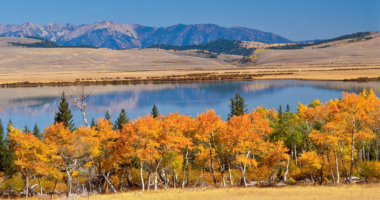Happy Birthday Clean Water Act – You’re 45 years old!

What the Clean Water Act means to Montana
 As we celebrate the 45th anniversary of the Clean Water Act, we need to be doing more, not less, to ensure safe, clean water for future generations.
As we celebrate the 45th anniversary of the Clean Water Act, we need to be doing more, not less, to ensure safe, clean water for future generations.
Whether fishing a mountain stream, irrigating alfalfa crops, or simply drinking a glass of water, every Montanan appreciates that clean water is critical for our state’s economic and environmental well-being.
As background on the Clean Water Act in Montana:
- Our state Water Quality Act is based on the federal Clean Water Act, which was originally passed in 1972—but has since been updated.
- The first clean water legislation in Montana was passed in 1907, responding to typhoid fever outbreaks in the Milk River Basin. That law required treatment of all sewage released into public water supplies (typhoid fever is spread through contaminated

Trumpeter Swans. Photo by Bob Martinka.
water (and food)). This legislation became the first in a series of laws leading to our current water quality statutes, collectively known as the Montana Water Quality Act.
- Our state’s clean water laws continue to grow and change. Since 1907, numerous clean water protections have been put in place in Montana, including water quality standards; a non-degradation policy (which outlines three levels of water protection and stipulates what degradation, if any, is allowable for each level); the Montana Source Water Protection Program that helps protect public ground water systems from contamination; several laws protecting water from hazardous waste and chemical pollution; and more.
Montana was given authority by the federal government to implement national Clean Water Act programs in 1974.
Reasons to Celebrate Montana’s clean water:
- The Clean Water Act helps protect innumerable creeks, streams, wetlands, and tributaries in Montana.
- We all love having clean drinking water come out of our tap!

- The Clean Water Act establishes the basic structure for limiting pollutants that might go into our lakes, rivers and streams. It provides legal authority for Montana to establish water quality standards too.
- If you fish, thank the Clean Water Act! Fishery management preserves and improves populations of wild fish, with a priority on conserving populations of native species, such as cutthroat trout, bull trout and Arctic Grayling.
- Silver Bow Creek in Butte and the Clark Fork-Blackfoot River confluence had almost lost all of their aquatic life and value for area communities just 10 years ago. Thanks to the EPA, Clean Water Act, and Superfund laws, today these areas are cleaned up and benefiting people, fish, and wildlife.
- Several lawsuits prevented mines from polluting Montana streams under the Clean Water Act, including the Seven Up Pete mine in the Blackfoot Valley and the Montanore Mine in Northwestern Montana.
- Many millions of federal dollars have come to Montana to protect our clean streams, wetlands, groundwater, rivers, and lakes.
What you can do right now:
Montana has a long history of standing up for clean water. Contact Montana’s Congressional delegation

Black-necked Stilt. Photo by Bob Martinka.
and tell them that they need to fully fund the Environmental Protection Agency and Clean Water Act programs that help Montana communities, streams, and rivers maintain clean water—and recover from pollution mistakes made in the past. In Montana contact: